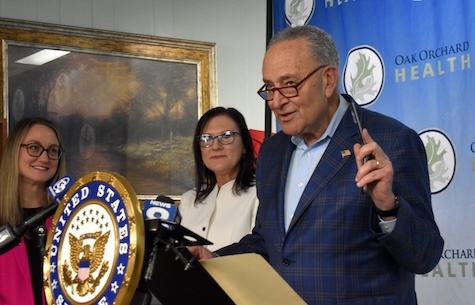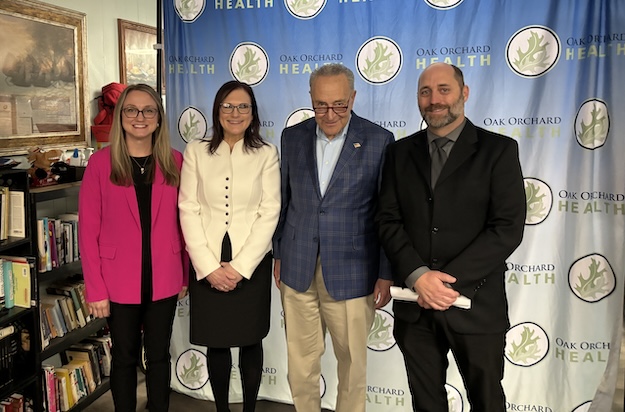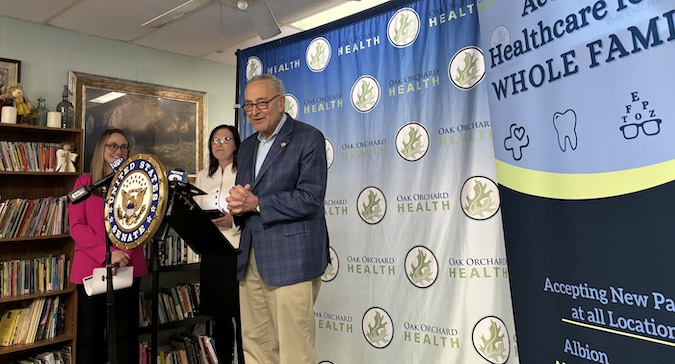Schumer pushes to keep telehealth services funded by Medicare
Speaking in Holley, senator says telehealth has improved healthcare access in rural areas
Photos by Tom Rivers
HOLLEY – U.S. Senate Majority Leader Charles Schumer was at the Eastern Orleans Community center today in Holley to highlight his push to keep telehealth services fully reimbursable by Medicare.
Schumer is shown at the eastern Orleans Community center with Dr. Danielle Renodin-Mead, Chief Medical Officer of Oak Orchard Health (left), and Renee Hungerford, executive director of Community Action of Orleans & Genesee, which runs the community enter in Holley.
“This helped thousands of seniors in rural areas across Upstate NY when the closest doctor is hours away access critical health care services,” Schumer said about telehealth services. “Telehealth is one of the biggest tools for supporting rural Upstate communities that face shortages of doctors. Especially for seniors who can have difficulty going to a doctor’s office due to mobility challenges, telehealth lets people get routine care without having to worry about how to get to the doctor’s office.”
Hungerford said it is “paramount” that telehealth continued to be covered by medicare and health insurers. She said telehealth has increased access to healthcare professionals for many Orleans County residents, who would often face transportation challenges to get to doctor’s appointments in person.

U.S. Senate Majority Leader Chuck Schumer wants telehealth services to become a permanent and accessible option for all on Medicare.
“As a key provider of health- related social needs, including facilitation of telehealth, we understand how critical telehealth is for vulnerable populations who live in rural areas with very limited transportation,” Hungerford said. “Losing the availability of payer-covered telehealth would result in people not receiving much needed care and would deteriorate positive health outcomes.”
Medicare started covering telehealth during the Covid-19 pandemic in 2020 and has continued to cover it since. However, that authorization is due to expire Dec. 31, 2024, Schumer said. He said there is bipartisan support to keep telehealth services as fully reimbursable through Medicare.
“Telehealth services are essential in places like Orleans County; it is a lifeline for our rural areas and seniors who can’t easily travel to the doctor to get the healthcare they need and we can’t let it expire,” Schumer said.
There are 9,770 senior citizens in Orleans County covered by Medicare, Schumer said. There are 14,219 in Genesee County, and 169,605 in Monroe, he said.
“We saw telehealth surge in use during the pandemic, and we should make sure that access to your doctor is as easy as picking up your phone,” Schumer said. “I was proud to help Medicare expand telehealth services during the pandemic, but we need to act quickly to preserve this program and ensure this lifeline isn’t cut off for our seniors come 2025.”
Dr. Danielle Renodin-Mead, Chief Medical Officer of Oak Orchard Health, said telehealth has been used at Oak Orchard, including by mental health counselors as well as other healthcare professionals.
“Telehealth breaks down barriers,” she said during a news conference with Schumer.

U.S. Sen. Charles Schumer was joined at today’s news conference by Dr. Danielle Renodin-Mead, Chief Medical Officer of Oak Orchard Health (left); Renee Hungerford, executive director of Community Action of Orleans & Genesee, which runs the community enter in Holley; and Marc Shurtz, CEO of Orleans Community Health and Medina Memorial Hospital.
Marc Shurtz, CEO of Orleans Community Health and Medina Memorial Hospital, said telehealth is a lower-cost option for care, and often much easier to access for residents in a rural community.
“Healthcare access in rural areas is often fraught with obstacles,” Shurtz said. “Long travel distances, a shortage of specialists, limited medical resources, and transportation challenges make it difficult for our patients to receive timely, consistent care. For seniors, these challenges can be even more daunting.”
Telehealth keeps patients engaged in their health management, particularly those with chronic conditions, Shurtz said.
“As we face the Medicare cliff we know that the financial strain it could place on healthcare providers could result in fewer services for our seniors,” he said. “Telehealth allows us to continue delivering quality care in a more cost-effective way, reducing the need for emergency room visits or hospitalizations.”



























































